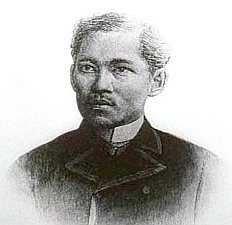December 30

On a date that will long be remembered for the execution of Saddam Hussein, we might recall another execution that took place 110 years ago at Bagumbayan Field in Manila. There, on 30 December 1896, the Filipino novelist, poet, sculptor, and linguist Jose Rizal was shot by a squad of Filipino infantry for the crime of rebellion against Spanish rule. The author of Noli me Tangere and El Filibusterismo -- two of the most important works of anti-imperialist fiction to emerge from Asia in the 19th century -- was accused by his colonial masters of working with the Katipunan, a secret society dedicated to the dissolution of Spanish authority in the Philippines. Members of the Katipunan promoted an egalitarian and nationalist ideology that rejected the class divisions reinforced by Spanish land ownership and resource extraction; when the existence of the society was disclosed in August 1896, the Katipuneros quickly resorted to armed insurrection as the Philippine Revolution commenced.
Although Jose Rizal was not a member of the Katipunan, he had founded La Liga Filipina -- a civic organization that eventually divided into several factions (one of which evolved into the Katipunan -- and was elected as its honorary president. As a political activist who had already faced deportation and exile in Mindanao during the early 1890s, Rizal was an easy target for Spanish authorities looking to crush the uprising. En route to Cuba, where had had been given leave to found a hospital for malaria victims, Rizal was arrested and returned to Manila for a trial that lacked even the basic components of due process. In the absence of any material evidence to support the charges, Rizal was nevertheless convicted of rebellion, sedition and conspiracy and sentenced to die. In his last hours, Rizal composed a poem known as "Mi Ultima Adios" ("My Last Farewell") and hid it in a small stove, where it was discovered after his execution. The final two stanzas of the poem read:
My idolized country, sorrow of my sorrows,
Beloved Filipinas, hear my last good-bye.
There I leave you all, my parents, my loves.
I'll go where there are no slaves, hangmen nor oppressors,
Where faith doesn't kill, where the one who reigns is God.
Goodbye, dear parents, brother and sisters, fragments of my soul,
Childhood friends in the home now lost,
Give thanks that I rest from this wearisome day;
Goodbye, sweet foreigner, my friend, my joy;
Farewell, loved ones, to die is to rest.
***
On the 104th anniverary of Jose Rizal's death, five ammonium nitrate bombs exploded in locations across Manila, killing 22 people. The explosives were laid by members of Jamaah Islamiyah, a group that would later achieve notoriety for the October 2002 bombings at Paddy's Bar and the Sari Club, which killed 202 workers and tourists in Bali, Indonesia. The Rizal Day Bombing was the 268th terrorist incident to occur across the Philippine archipelgo in 2000, a year in which 142 Filipinos died and nearly a thousand wounded in such attacks.